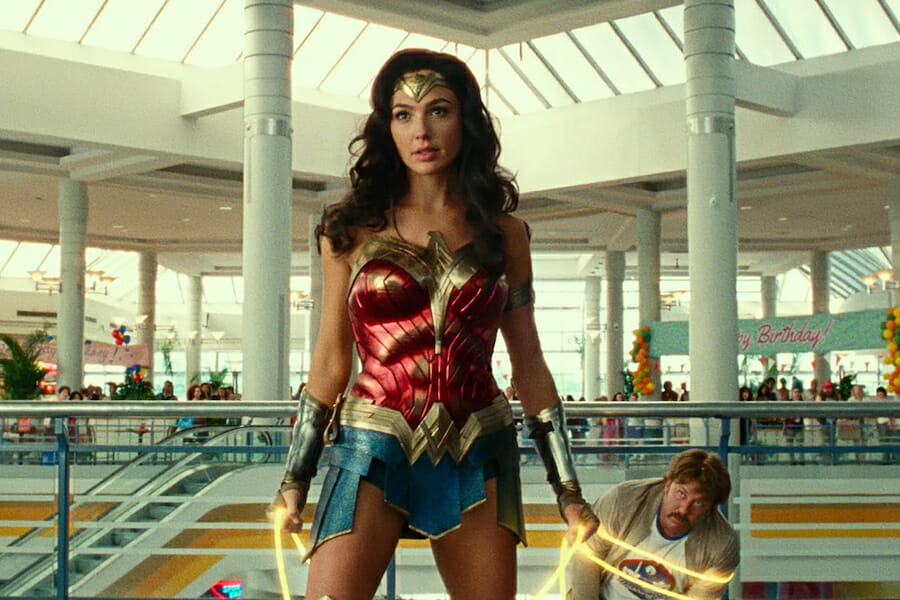
Wonder Woman and the Blue Pill
If you’re in possession of a device with a screen, you’re probably aware that there’s a new Wonder Woman movie out. Called Wonder Woman 1984, it’s a follow-up to the first Wonder Woman movie released three years ago. And like the first one, it stars Israeli actor Gal Gadot.
Anyone who works in or adjacent to the realms of fandom is acquainted with the importance of this particular character. Fictional though she may be, Wonder Woman is a role model for many women and girls (and others), and especially those who grew up watching the Wonder Woman TV show, as I did. For years, there weren’t many choices when it came to female role-models in fandom, and especially in comics. If you were a budding geek, Wonder Woman probably filled the role for you, and that legacy of meaning, of import, holds true to this day.
For many people, Wonder Woman is a symbol, not a character.
Like all things of import, symbols grow to become sacred over time. What starts as a means of necessary escape, fantasy fulfillment, or relatable aspiration, sprouts that halo of sanctity that wreathes itself around just about all of our mythmaking. They are things of sentimental value, our symbols. And by and large, the tougher the times, the harder we all cling to them.
When the first movie came out, a socially responsible segment among the American left decried the production, with some calling for a boycott of the movie. Certain Arab states declined to screen the film in their theaters. Here in America, all of the above were predictably accused of anti-Semitism, and not merely by the far-right, but by the left, as well.
YouTube is full of videos from the extensive press junket Ms. Gadot and her people undertook to promote Wonder Woman. And in almost every case, the scene is the same: Wide-eyed girls and young women approaching Gal Gadot, eager for an autograph or a moment of personal connection, awestruck not merely by celebrity, but by the presence of a hero. To them, Gal Gadot was Wonder Woman. Such is the power of the symbol.
But Gal Gadot is not Wonder Woman. In fact, based on history and stated views, Gal Gadot is so very not Wonder Woman that it becomes actively alarming to even watch her pretend to be that symbol, let alone watch the fallout wrought by her casting.
Gal Gadot did not serve in the IDF because it was “mandatory” (a canard oft-repeated in certain circles as a lazy way of dismissing criticism). In fact, the Israeli system provides over a dozen ways to avoid military service, several of which were probably available to her. No, Gal Gadot chose to pick up a gun and help maintain the world’s longest-running illegal military occupation because she wanted to. Gal Gadot has yet to even publicly acknowledge that same illegal occupation, let alone condemn it strongly and call for justice for the Palestinians, and her history of politicized tweets is a matter of public record.
After watching the new movie, a friend came to talk to me about it and to spoil me on the fact that there’s a Lynda Carter cameo in it. My friend identifies as a liberal, a progressive, and a mom. We discussed the matter of the casting choice back before the first movie came out, so this friend knows all about Gal Gadot and the pernicious cynicism of Hollywood. My friend considers herself anti-occupation and pro-Palestinian self-determination.
Knowing that I’m a Palestinian-American, this friend also knows how painful it would be for me to hear that she supported the new movie, and how additionally painful it’d be for me to hear that Lynda Carter, who I adored as a kid, had likewise lent her endorsement to the project.
Even knowing the truth, my friend made the choice to support the movie financially. Even knowing the truth, she chose to defend the film’s merits directly, and to further make the case for why she felt it appropriate to do both of these things. As a symbol, Wonder Woman is just that important, that sacred.
My friend’s mindset is endemic of a broader phenomenon at work in our culture, and especially on the left, where PrEP (‘progressive except on Palestine’) is very much a thing. This mindset can be summed up in a metaphor from another movie.
One may recall the red pill/blue pill scene from the seminal sci-fi film The Matrix. In it, the main character is offered a choice: Take the red pill and choose to live inside the truth, however unpleasant that truth may be; or take the blue pill and make the choice to enjoy the bliss of merciful ignorance, forever.
When it comes to some issues, especially the Black Lives Matter movement, the American left is fully committed to not merely ‘taking the red pill,’ but to strongly encouraging others to take it, too. On that issue, public pressure has been strong enough to affect material change. Long-tenured professionals have lost their jobs for saying “all lives matter” in sufficiently public venues. Businesses have suffered losses, and in some cases, been forced to close down, simply for not saying Black lives matter. And the American left is largely comfortable with those results, granting few exemptions from the duty of social responsibility.
Yet, the producers of the Wonder Woman movie franchise are enjoying just such an exemption as they surely knew they would when they set out to capitalize on a sacred symbol. Despite the fact that they are engaging in a large-scale commercial enterprise, a global money-making endeavor, they’re still meeting with precious little of the type of pushback that is normally the specific purview of such cases. This sequel is by far the biggest movie of the year, and to date, the price for the producers’ so-cynical-it’s-grim profiteering has been…nothing. So far, all they’ve done is profit by it, and there seems to be no end in sight when it comes to future profit potential. Indeed, it took the studio all of 48 hours to greenlight the next film in the franchise, despite Wonder Woman 1984 being panned critically.
After all, Wonder Woman is beloved here.
Even for someone like my friend, someone who knows the truth about Gal Gadot and about the cynical and dangerous corruption of fandom her casting and empowerment reflect, the final analysis is that it’s all worth it in order to give people their aspirational comic book movie. Yes, even though they already got it, and yes, even though that first one made a mint. Even for the woke, getting a comic book movie sequel is more important than acknowledging the unsupportable realities behind the film’s creation and then behaving accordingly.
People like my friend are not saying the realities aren’t real. They’re saying that those realities matter less than America getting another Wonder Woman movie. The realities may be unfortunate, but we need our Wonder Woman — even if it’s just a lifelike mask being worn by a racist. What they’re telling us is that when it comes to this, we don’t really want the truth.
We want the blue pill.

